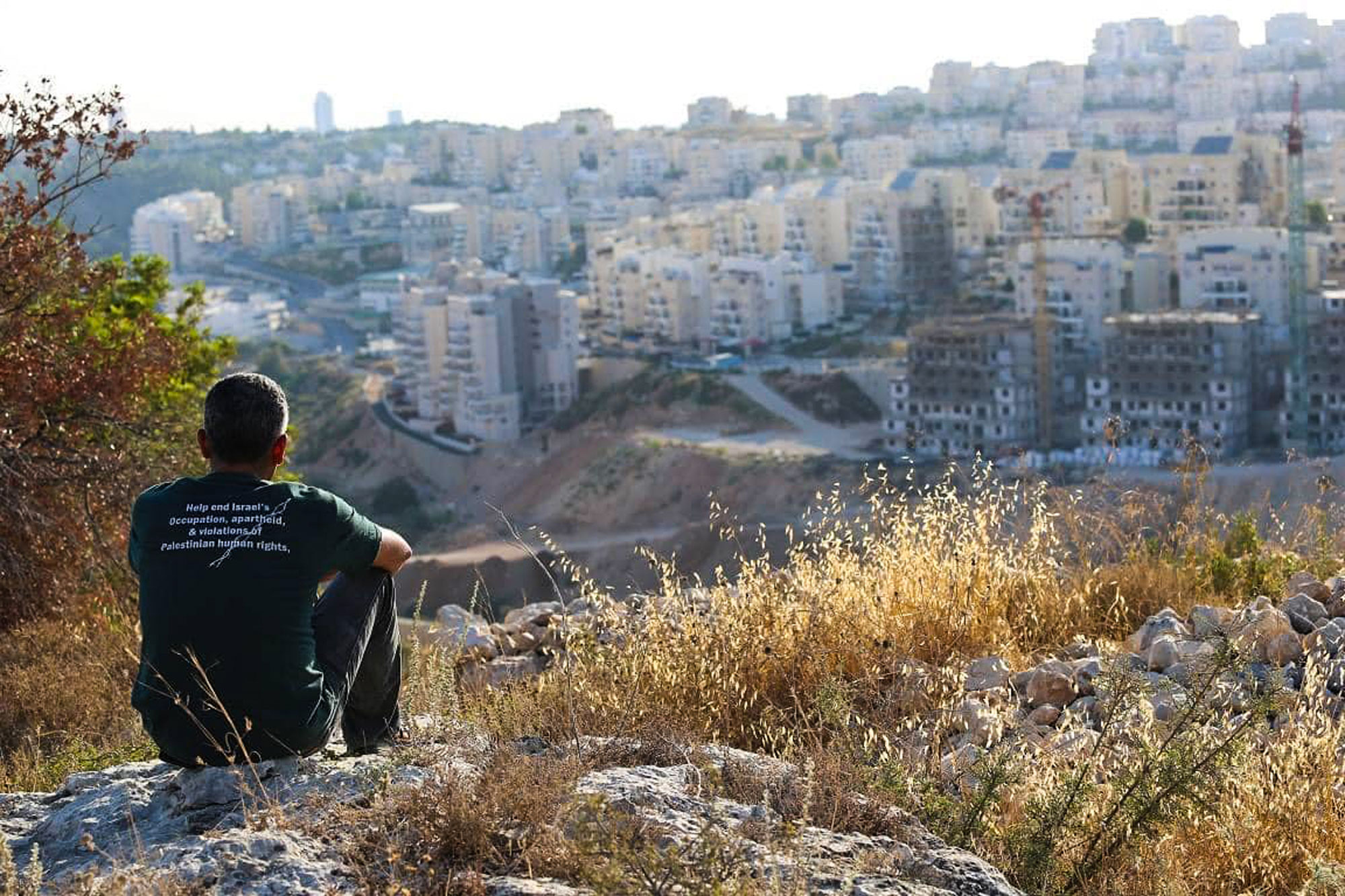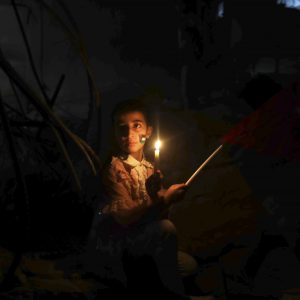Palestinian children in detention without trial
Arrested in terrifying dawn raids in the Occupied Territories, teens as young as 13 are taken by Israeli authorities and held sometimes for months. Many are tortured.
Author:
31 March 2022

“We can’t explain the feeling when a big group of soldiers attack our homes in the night, kidnap our children many times and break everything in the house,” said Iyad Burnat, author of Bil’in and the Non-Violent Resistance.
Burnat is the leader of the Popular Committee Against the Wall in Bil’in, a village in the occupied West Bank that has been split in two by a massive concrete barrier – known popularly as the “apartheid wall” – Israel began erecting in 2003. His sons, Muhammad Iyad Burnat, 18, and Abdel-Khaleq Burnat, 21, were among the thousands of Palestinians arrested on trumped-up charges last year as punishment for mass protests by Palestinians in Jerusalem and the West Bank, which took place after Israel invaded Gaza.
Amnesty International said at the time that many of the arrested Palestinians were charged with offences such as “insulting a police officer” or “taking part in an illegal gathering”. Muhammad, Abdel-Khaleq and five other young men from the tiny, olive-farming village were arrested for setting a bus on fire in a nearby Israeli settlement. But the young men were nowhere near the heavily fortified settlement, which has no possible entry points for Palestinians. It is unclear whether the bus was ever burnt.

Of the 4 400 Palestinian political prisoners in Israeli jails, 160 are Palestinian children, which does not include the number of prisoners who have turned 18 since they were first jailed. Abdel-Khaleq was first arrested when he was 16. Though Iyad Burnat’s family is well known, it has not helped his sons escape detention without trial. Burnat has travelled the world speaking about the non-violent resistance to the wall in Bil’in village. His brother is Imad Burnat, who, in 2012, was the first Palestinian director to be nominated for an Oscar for his film Five Broken Cameras, which is about the struggle of the Bil’in villagers against the Israeli military occupation.
In pride of place at Iyad Burnat’s home is a photo of him with Archbishop Desmond Tutu. Burnat recalls the conversation Tutu had with the village committee about how the apartheid government in South Africa used detention without trial as a weapon against activists. “We agree there is no justice in a system where our sons go to jail without trial,” said Burnat.
Tutu was just one of the many international luminaries who have visited Bil’in village over the past 17 years to take part in the Friday protest against the wall. The weekly demonstrations, which attract hundreds of pro-Palestinian Israelis, international activists and members of parliament from all over the world, are often themed. One demonstration featured hundreds of people holding aloft a 50m-long Palestinian flag. Another featured Holocaust survivor and concert pianist Jacob Allegro playing a piano recital next to the wall. Yet another was led by Palestinian wheelchair users, many of whom became paraplegic after Israeli soldiers shot them in the spine during the early days of the Second Intifada in 2000.
Related article:
The village succeeded in 2007 in winning an Israeli high court judgment that the wall had illegally confiscated some of the village’s land, which was then returned.
Dozens of high-profile musicians, writers and politicians from all over the world last year petitioned the judges at Israel’s Ofer military prison to release the Bil’in boys – Pink Floyd’s Roger Waters, Code Pink founder Medea Benjamin, and the director of Jewish Voice for Peace Rebecca Vilkomerson among them.
“Anyone who has been to the village of Bil’in knows it’s impossible for any Palestinian to get anywhere near that illegal settlement, much less set a bus on fire,” the petition signatories wrote. “If they had approached the wall separating Modi’in Il’lit [the Israeli settlement] and Bi’lin, they would have been recorded, if not shot. There has never been a news report on any major Israeli news platform of a bus set on fire by a Molotov cocktail or any other incendiary method.”
Campaign on behalf of the children
After being arrested, Abdel-Khaleq was allowed to speak to a lawyer online, which is how it came out that the Israeli military was torturing him on the “ghost chair” for 15 hours a day. This is a small chair with front legs shorter than the rear ones. “Its back is also shorter than a regular chair, and the hands and feet are tied to inflict maximum pain,” Burnat wrote on a social media post.
Abdel-Khaleq was later released and said the military tortured him for 55 days. “My son was thrown blindfolded, handcuffed, and with his feet tied up into a bathroom in the cells for three consecutive days without food or drink,” Burnat wrote.
The activist posts a monthly photo of his son Muhammad, who has now been detained without trial for 10 months, on social media along with any information he has managed to gather on his condition. “My son Muhammad tells his mother during a court hearing that during the month of the investigation, he was transferred to the doctor three times as a result of the torture he was subjected to,” Burnat wrote in one post.
Related article:
Israeli military rules say that any Palestinian child over the age of 12 can be held in a military detention facility. Salim Vally of the Palestine Solidarity Campaign and director for the Centre for Education Rights and Transformation at the University of Johannesburg says detention without trial in Palestine is reminiscent of the situation under apartheid.
“Israel is the only country in the world that systematically tries and imprisons children using military courts and it only does this with Palestinian (not Israeli) children, so the racism is very apparent. Since the year 2000, Israel’s occupying army has detained an estimated 10 000 Palestinian children. The imprisonment of any Palestinian, adult or child, from the Occupied Territories is illegal under international law, and many human rights organisations also report on the regular, consistent torture of Palestinian children by Israeli soldiers, police and the prison guards,” said Vally.
He added that the Palestine Solidarity Campaign and the South African Boycott, Divestment and Sanctions Coalition have called on South Africans “to campaign on behalf of these children as we called on the world to campaign on behalf of South African children detained by the apartheid regime”.
On the oppressed side of the regime
Israeli Apartheid Week, an annual series of lectures and rallies held in February or March in cities across the globe, this year spotlights the case of Ahmad Manasra who was 13 years old when Israeli soldiers arrested him in 2015 after his cousin stabbed two Israeli settlers. Manasra, who was with his cousin at the time of the attacks, was hit by a pursuing car and suffered a fractured skull and internal bleeding. He was charged with attempted murder despite not having been directly involved in the stabbing. The now 20-year-old Manasra has been in prison ever since, sentenced to nine and a half years. A video of Israeli soldiers interrogating Manasra leaked to the international media, has been watched hundreds of thousands of times but “the world has yet to answer”, the Palestinian-Global Mental Health Network said.
The network added that Manasra’s mental health had deteriorated because of Israel’s “structural psychological war, ongoing systematic torture and racism” against him, which includes being forced into solitary confinement for up to four months at a time.
Sick youth are not spared these ordeals in prison. Amal Nakhleh was 17 when he was detained during a dawn raid on his home in January 2021. He has been placed under successive “administrative detention orders” ever since, which the Israeli military courts say are based on secret evidence.
“Neither Amal nor his lawyers or family have been informed of the reasons for his arrest and detention. Amal’s case is one of the more prolonged cases where a Palestinian child has been detained without charge or trial,” said Juliette Touma, spokesperson for the United Nations Children’s Fund, which is campaigning for his release.
Related podcast:
Defence for Children International, also supporting Nakhleh, says the rare neuro-muscular disorder from which he suffers means he should be under “constant medical supervision. Nakhleh has myasthenia gravis, which causes muscle weakness, and can prevent him from swallowing or breathing. One medication Amal requires to strengthen his immune system has some life-threatening side effects. Due to symptoms of the disease, Amal may be unable to swallow his medication, which then requires urgent care at a hospital,” said the movement for children’s rights.
Addameer, the Palestinian prisoner support and human rights association, points out that the families of young Palestinians often have to pay heavy fines of up to 78 000 Israeli shekels (about R350 000) to secure their release from prison. This is unaffordable for Palestinian villagers who survive off a very small income earned from selling the olive oil generated from about 15 trees.
Israeli pro-Palestinian activist and author Miko Peled describes the incarceration of Burnat’s sons as a ghastly “coming-of-age ceremony that countless young Palestinians must go through because they live on the oppressed side of an apartheid regime”.
He has visited Burnat to express solidarity. “Knowing that your children were kidnapped and are now being tortured, beaten and threatened with no one to support or help them and there is no law or authority that can provide them protection! If one or both of them were to be killed or permanently injured, there would be no recourse,” Peled said.
Full disclosure: Anna Majavu participated in the weekly demonstrations against the wall in Bil’in village in 2004 and 2005.




